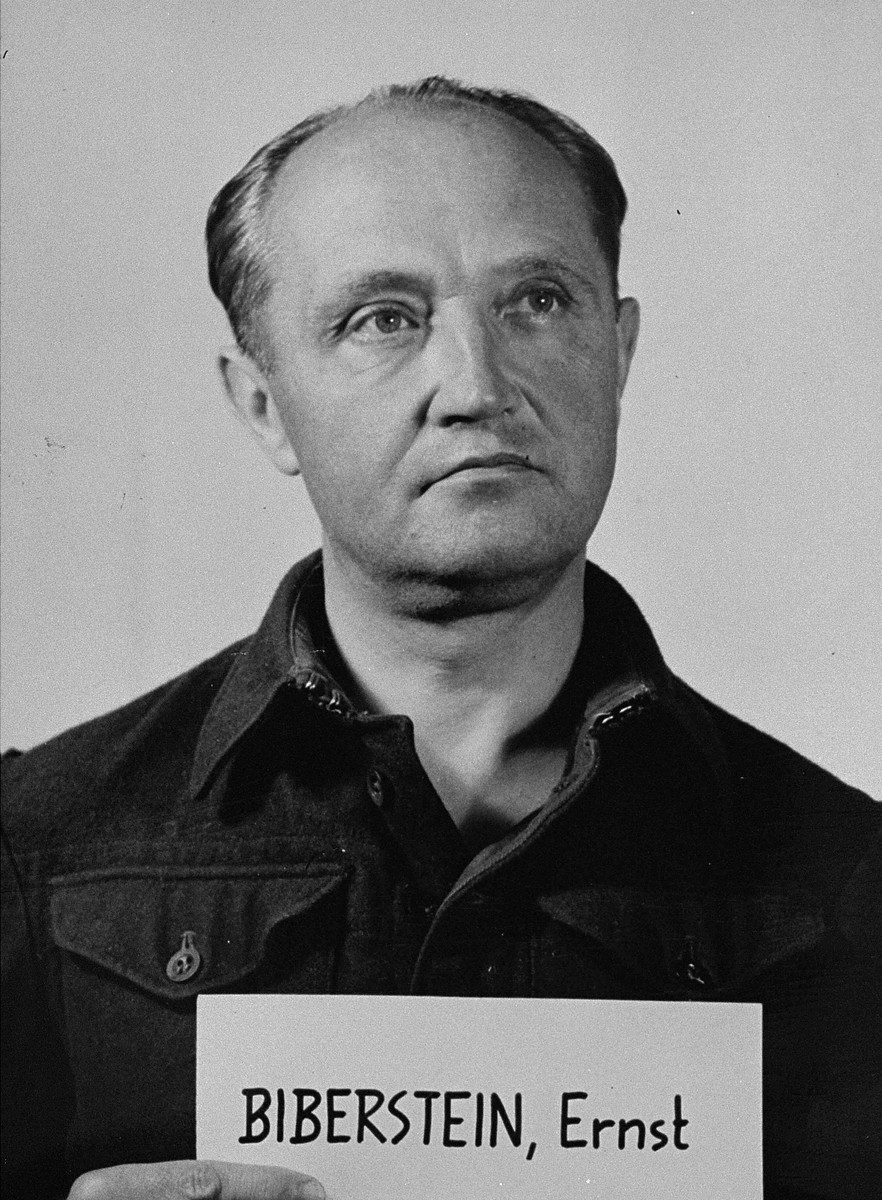1. Early Life
Ernst Biberstein was born Ernst Szymanowski on February 15, 1899, in Hilchenbach, located in the Province of Westphalia, Germany. He received his early education in Mülheim. His military service began during World War I, where he served as a private from March 1917 until 1919. Following his discharge from military service, Biberstein pursued theological studies from March 1919 through 1921. He was ordained as a Protestant pastor on December 28, 1924, dedicating himself to religious life. In 1935, he entered the Reichskirchenministerium, a ministry established by the Nazi regime to control Protestant churches, and was later transferred to the Reichssicherheitshauptamt, the leading security and intelligence organization of the SS.
2. Involvement with the Nazi Regime
Ernst Biberstein's involvement with the Nazi regime escalated significantly after his early affiliations, taking on critical roles within the Gestapo and ultimately commanding a mobile killing squad responsible for mass atrocities. His actions highlight the profound human rights impact of his complicity in the Nazi machinery of extermination.
2.1. Early Affiliation and SS Membership
Biberstein's path towards complicity with the Nazi regime began in 1926 when he officially joined the Nazi Party. His commitment deepened when he became a member of the SS on September 13, 1936, holding the membership number 272692. Upon joining the SS, he was assigned to the SD, the intelligence agency of the SS and the Nazi Party. From March to October 1940, he served again as a soldier, engaging in military duties, likely on the Western Front.
2.2. Gestapo Role and Name Change
On June 1, 1941, Biberstein was appointed head of the Gestapo office in Opole (also known as Oppeln). In this capacity, he became directly complicit in the forced deportations of Jews, implementing the Nazi regime's antisemitic policies that led to widespread human suffering and death. In the same year, Biberstein changed his surname from Szymanowski to Biberstein, adopting what was presented as his supposedly original German family name, a common practice among individuals within the Nazi hierarchy seeking to shed perceived Slavic or Jewish associations.
2.3. Command of Einsatzkommando 6 and Atrocities
Following the assassination of Reinhard Heydrich, a key architect of the Holocaust, Ernst Biberstein was appointed commanding officer of Einsatzkommando 6 in June 1942 and commanded it until 1943. This unit operated under Einsatzgruppen C, one of the primary mobile killing squads responsible for the mass murder of civilians, primarily Jews, in Eastern Europe. Under Biberstein's command, Einsatzkommando 6 was responsible for the systematic execution of approximately 2,000 to 3,000 people, a vast majority of whom were Jewish.
Biberstein did not merely issue orders; he actively participated in and personally supervised these horrific acts. At Rostov-on-Don, he personally oversaw the execution of an estimated 50 to 60 individuals. These victims were subjected to extreme dehumanization, being stripped of their valuable possessions and often their clothes before being gassed and left in mass graves. Furthermore, Biberstein was present at other executions where victims were forced to kneel at the edge of pits, subsequently being killed with submachine guns. His direct involvement and supervision underscored the brutality and profound violation of human rights that defined the actions of the Einsatzkommando units under his leadership.

3. Nuremberg Trial and Later Life
Ernst Biberstein faced accountability for his egregious actions within the Nazi regime after World War II, undergoing legal proceedings at Nuremberg and spending years in imprisonment before his eventual release.
3.1. Trial and Conviction
After the war, Biberstein was among the defendants indicted at the Einsatzgruppen Trial, one of the Nuremberg Trials held by the Allied powers. His trial commenced in September 1947 and concluded on April 9, 1948. Despite pleading not guilty to all charges at his arraignment, overwhelming evidence was presented against him. Einsatzkommando 6, under his command, was charged with the execution of an estimated 2,000 to 3,000 individuals, a figure that heavily included Jewish victims. It was specifically revealed during the proceedings that Biberstein had personally overseen the execution of 50 to 60 people at Rostov-on-Don. The court heard testimonies detailing how victims were stripped, gassed, and disposed of in mass graves, and how Biberstein was present at other executions where victims were forced to kneel at pit edges and shot with submachine guns. Based on this evidence, Ernst Biberstein was found guilty of war crimes and crimes against humanity, and consequently sentenced to death by hanging.
3.2. Commutation, Release, and Post-War Activities
Biberstein's death sentence was later reviewed by the "Peck Panel" and commuted to life imprisonment in 1951. Despite this commutation, he was denied parole on multiple occasions, reflecting the severity of his crimes. However, in 1958, the Federal Foreign Office of West Germany filed parole applications on behalf of all four inmates, including Biberstein, who were still serving time in Landsberg Prison. Although Biberstein was initially denied parole, the board ultimately voted unanimously to commute his life sentence, along with those of the other three inmates, to time served. This decision became official on May 6, 1958, leading to Biberstein's release three days later, on May 9, 1958. Following his release, Biberstein temporarily returned to his former profession as a clergyman. He lived until 1986, passing away in Neumünster on December 8, 1986.
4. In Popular Culture
Ernst Biberstein's involvement in the atrocities of the Holocaust was depicted in the 1978 NBC television miniseries entitled "Holocaust". In the miniseries, Biberstein was portrayed by the English actor Edward Hardwicke.